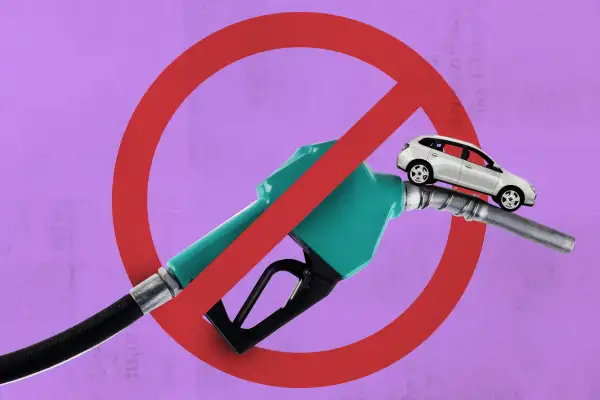8 States Now Plan to Ban Gas-Powered Car Sales

At least eight states plan to ban sales of new gas-powered cars after 2035, and several others are thinking about joining them.
The rules being adopted specify that only zero-emission vehicles — including electric vehicles and some plug-in hybrids — can be sold in participating states beginning with the 2035 model year.
Traditional gas-powered cars on the road at that point wouldn't be affected, and drivers would still be allowed to buy used gas-powered cars. Automakers and dealerships, however, would be prohibited from selling new gas vehicles in states where bans are in place.
At the federal level, the Environmental Protection Agency (EPA) released new rules on Wednesday that would require automakers to reduce the emissions of new vehicles by about 50% from model year 2026 to 2032
To get there, the EPA says it's likely that 35% to 56% of vehicles will need to be EVs, and between 13% and 36% will need to be plug-in hybrids. These targets are less ambitious than an earlier EPA proposal that would have essentially required that 67% of new car sales be electric vehicles by the 2032 model year.
States banning new gas-powered cars
Rhode Island was the most recent state to join the group with plans to ban sales of new gas-powered cars. A statement from the governor's office in May called the move "a pivotal moment in Rhode Island’s efforts to fight climate change."
- California was the first state to adopt the Advanced Clean Cars II rule, which at least seven other states have now embraced.
- California's plans specify that 35% of new car sales will need to be zero-emission vehicles by 2026, with that number rising to 68% by 2030.
- In a March 2023 statement announcing Maryland's plan to phase out sales of new gas-powered cars, Gov. Wes Moore said “it’s a major step in the state’s acceleration to improve air quality and combat the effects of climate change.”
- All of the planned bans are in coastal states: In addition to the three states already mentioned, Massachusetts, New Jersey, New York, Oregon, Washington and the District of Columbia have made the commitment to stop allowing sales of new gas-powered vehicles after 2035.
- Generally, the states' plans have not required votes from their legislatures. Instead, they’ve been advanced with support from governors and environmental regulators.
Other states consider gas car bans
Megan O'Toole, with the Vermont Agency of Natural Resources, says the state adopted Advanced Clean Cars II in December 2022, including the 2035 zero-emissions vehicle requirement for new car sales. However, Vermont Gov. Phil Scott has not come out in support and his office did not respond to a request for comment.
Virginia Gov. Glenn Youngkin vows that the state will not ban sales of new gas-powered cars after 2035, but the state's emissions standards are currently tied to California's, and the latest effort to repeal the law failed in the state senate in January. As a spokesperson for the sustainability nonprofit Ceres explains, "Virginia passed legislation coupling the state with California standards... For now VA is technically required by law to implement ACC II starting with Model Year 2026."
In the fall, Delaware and Colorado finalized rules that would require 82% of new cars to be zero-emissions vehicles in 2032, but officials have not adopted 2035 bans.
New Mexico Gov. Michelle Lujan Grisham announced in July that the state will set annual targets for the sale of new zero-emission vehicles, and New Mexico may adopt parts of Advanced Clean Cars II. Like Delaware and Colorado, New Mexico has not endorsed the 2035 ban. The rules the state is advancing "do not prohibit the sale or ownership of new or used gasoline-powered vehicles," according to a spokesperson for Lujan Grisham.
For a brief period of time, nine states were pushing toward 2035 bans, but Connecticut Gov. Ned Lamont withdrew his plan when it met legislative opposition. The issue is expected to be revisited this year.
Why bans of new gas car sales matter
As states come out with plans to ban new gas-powered cars, automakers could feel pressure to accelerate their production of electric cars.
In 2023, 7.6% of new vehicle sales were electric, a major increase from 3.2% in 2021, according to Kelley Blue Book. The transition to electric cars is already underway, and the 2035 bans show how quickly it could speed up.
Automakers shift to EVs
Ultimately, it's unclear how restrictive these bans will end up being, given that major automakers are ramping up production of electric vehicles with the intention of phasing out gas-powered models.
- For example, General Motors expects to have completed a full transition to electric vehicle sales by 2035. Some smaller automakers have announced even more ambitious timeframes.
- European Union lawmakers have approved a full ban on new gas-powered cars beginning in 2035, so it's hard to imagine that many gas-powered cars from European automakers will still be on the market in the U.S. by that time.
More from Money:
3 Reasons Why New Car Costs Are Higher, Even Though Prices Are Dropping

